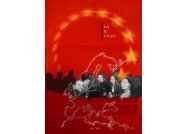turkish-greek civic dialogue - AEGEE Europe
turkish-greek civic dialogue - AEGEE Europe
turkish-greek civic dialogue - AEGEE Europe
You also want an ePaper? Increase the reach of your titles
YUMPU automatically turns print PDFs into web optimized ePapers that Google loves.
Participants tackled the issue of close group formation in the light of ‘evidence<br />
from Turkey and Greece as to how perceptions and attitudes changed about the<br />
Other’. “Each group has a balanced environment within itself. There is some<br />
extent of equality or hierarchy amongst the group members. If some members<br />
of the group get into contact with some other people or some other things from<br />
the outside world, the group’s peculiarity of being a close one is endangered.<br />
When the relation with the outside world is minimized, or the members are<br />
isolated from the outside world, the group becomes closer. This situation may<br />
be observed in some religious sects. The sect leader imposes the idea that the<br />
world is too dangerous and all the group members are safe when everyone is<br />
together, it’s a really successful technique to have a closer and faithful group,<br />
where it also gets easier to control the group.”<br />
OUTSIDE THE GROUP INSIDE THE GROUP<br />
Rivalry Cohesion<br />
Threat Identity<br />
Competition<br />
It’s actually the same technique some politicians use. For example, Turkish<br />
people are convinced that all the neighbours of Turkey and all other countries<br />
around the world are working to divide Turkey into pieces and weaken the<br />
country. The majority of Turkish people are brought up with this cliché and<br />
this policy has always been used to hide some failures in foreign relations or<br />
anywhere the politicians like. It’s also an opportunity to direct the people’s<br />
interest towards some other topics other than economic problems or failure<br />
of the government. This situation has been experienced by Turkey and Greece<br />
for a long time.”<br />
“In a psychological experiment, which was conducted during a youth camp,<br />
the participants were split up into two groups. These two groups stayed in<br />
different tents and all the competitions and matches were organised using<br />
these two groups as teams. The groups were isolated from each other did not<br />
see each other except from the competitions. The result was interesting: the<br />
groups started to see the opposite as enemies and there appeared tension<br />
between them, so the first part of the experiment was over. The aim of the<br />
second part was different: to make these groups come together and make them<br />
friends. At first, groups were brought together outside of the tents for some<br />
ice-breaking activities. However it didn’t work out.<br />
Association des Etats Généraux des Etudiants de L’<strong>Europe</strong><br />
Afterwards the groups were accommodated in the same tent and the teams for<br />
the competitions were mixed. This didn’t work out as well and the members<br />
continued to see each other as enemies and started fighting. Finally the pipes<br />
of the camp carrying water were broken by the experimenter deliberately and<br />
the groups were told to repair it together, otherwise they would not have any<br />
water in the camp. And it worked out. The members from the groups started to<br />
get closer and help to the others without taking into consideration from which<br />
group the person was coming.<br />
“Could you see how similar is this experiment to the relations of Turks and<br />
Greeks during the earthquakes?”<br />
DAY 4<br />
The discourse of the day was: how to prevent the perception “us versus them”?<br />
The participants examined some samples from the press and they all worked on<br />
the case “defining yourself by using the word Turkish or Greek”. The importance<br />
of the nationality in terms of assessing a person and his/her identity was the<br />
highlight of the discussion. The participants questioned whether they should<br />
give importance to someone’s nationality or not. The discussion continued<br />
on social engineering, which requires isolation of nations from each other<br />
under flags and borders. The importance of a flag versus a human’s life was<br />
questioned.<br />
The participants also worked on the effect of referring to things and places<br />
with ethnic adjectives, where the workshop leader stated his discomfort<br />
with using the name of “Turkish Psychological Association” or referring to<br />
some Aegean islands as “Greek island “or “Turkish island”. Instead of these<br />
adjectives “Turkish” and “Greek”, use of “Turkey Psychological Association”<br />
or “an island of Greece” were proposed. Participants concluded that the<br />
adjective of ethnicity should only be used for the culture and language and<br />
any other definition should refer to the land of all the people who lives in.<br />
Participants also concluded that people should not tell others how they<br />
should name themselves.<br />
During the workshop, the participants also visited and interviewed with “Lütfiye<br />
Nine” from Kayaköy who witnessed as a kid the population exchange in 20s<br />
when Greeks were leaving their houses behind. The participants listened to the<br />
KayaFest Youth and Culture Festival<br />
89







